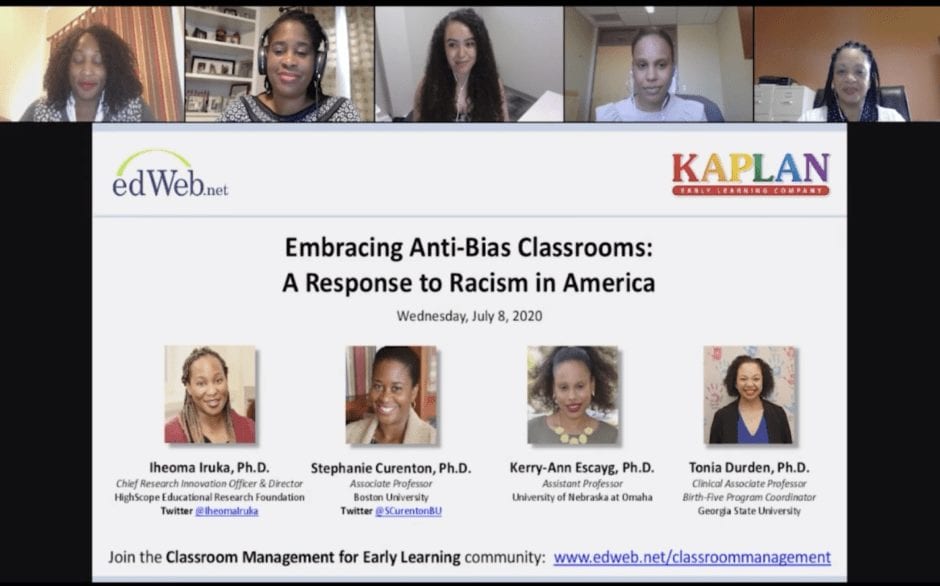Becoming an Anti-Racist Childhood Educator and Social Warrior
By Michele Israel
Anti-racist education in early childhood classrooms is far more than a multicultural lesson or two. It requires educators to deeply understand how institutional racism comes to be and manifests in environments where young students learn.
In a recent edWebinar sponsored by Kaplan Early Learning Company, “Embracing Anti-Bias Classrooms: A Response to Racism in America,” four recognized early childhood education specialists, and lead authors of the newly released book Don’t Look Away, Embracing Anti-Bias Classrooms, emphasized that to challenge bias, educators have to recognize the role implicit bias, microaggression, and white privilege hold in undermining the learning experiences of marginalized Black and brown children.
Is My Classroom Equitable?
Many teachers believe their classrooms are bias free. The reality is that instructional practices and policies tend to emerge from an inherently racist foundation. For early childhood educators to become equity advocates, they must fully explore racism’s deep roots to eradicate it.
Dr. Iheoma Iruka contended that the early childhood classroom, even with well-meaning teachers and inclusive approaches, still rests in a system that was designed to “fix” Black children assumed to not be faring as well as their white counterparts.
The results were a mix of programs that discounted the community’s and parents’ contributions to children’s education and the historically successful Black independent schools that were the epitome of Black identity development and academic and cultural excellence. In fact, reported the presenters, integration resulted in educational inequities along with a decline in Black cultural identity and the disappearance of Black educators.
The school system, argued Dr. Stephanie Curenton, is based on one of privilege, framed around a white perspective that drives educational outcomes along racial lines, with a clear demarcation between the disadvantaged and advantaged.
In essence, expressed Dr. Iruka, the system reframes a common tenet, “That Black people mostly—or people of color, poor people—who are stressed and live in the oppression of America, we can do your job better than you.”
Dr. Kerry-Ann Escayg contended that racist attitudes and beliefs emerge from a social construct of race that has no biological validity. Race, as an invented concept, has resulted in an unjust system with powerful ramifications and functions in subversive and oppressive ways.
The impact, the panelists emphasized, is systemic bias that plays out in the classroom in various forms, such as exclusionary educational practices and disciplinary actions that disproportionally target Black children. While some may argue that these are unconscious acts not based in racism, Dr. Tonia Durden emphasized that in fact, because certain practices are based in policy, they are deliberate.
“We very well can help it because those things are explicit,” Dr. Durden urged. “Those things are intentional and are things we can definitely correct within the system.”
The Construct of True Anti-Racist Education
Teachers committed to true anti-racist instruction and learning must ask themselves: What are the knowledge bases of early childhood education that reproduce racial inequalities? Are certain voices, experiences, and identities excluded from how we conceptualize early childhood education? How does the work I do connect to the larger system and programming?
Such questioning, urged Dr. Escayg, moves discussions beyond individual prejudice and bias to examining and critiquing systems and policies along with their historical underpinnings. At the heart of anti-racist early childhood education, she emphasized, is institutional critique combined with advocacy and transformation.
In that context, early childhood educators can promote positive racial identity that becomes a site of empowerment, agency, and resistance, all of which have been instrumental in pushing back against daily assaults of microaggressions and covert/overt racist acts targeting people of color.
Anti-Racist Education: How to Get There
What can teachers do to advocate for racial equity in the classroom, build a positive Black identity, and create a space to promote a sense of belonging for children of color? The presenters agreed that the steps are broad but necessary.
The most important step is to truly start at the top, examining, challenging, and changing policies and standards that tend to disrupt the educational experiences of Black students. Such work requires recognizing the historical race-based context of current systems. It is not enough to focus on prejudice and bias only in the classroom.
Anti-racist early childhood educators must closely study play-based learning to utilize cultural knowledge, particularly that of parents, to construct an equitable play environment. This will help to eradicate racialized play that results in the constant punishment of Black and brown children in school, evidenced through high rates of suspension and expulsions of these students.
Educators should interrogate the meanings they assign not only to their white identity but also to the identities of people of color. They need to think about the daily experiences of Black and brown children vastly different from those of their white peers. This discovery can lead to learning environments that embrace all students. But, this means the adults in the system must learn what is at the core of racist classroom practices to avoid replicating them again and again.
Training and preparing a future anti-racist teaching force is a necessity. The panelists noted that there is a lack of pre-service coursework that gives teachers the skills to facilitate racially equitable classroom interactions. Recruiting greater numbers of teachers of colors is one solution. In-service training and resources should also be available to ensure ongoing racial equity and anti-bias instruction.
It is critical for educators to partner with parents and the community, both influencing children’s cognitive development, health, and education. Such partnerships return to what was historically a whole-child mission. Even more important is building family-centered parent-teacher relationships to address longstanding stereotypes that have been attributed to Black families, that they are not involved or do not care.
Selecting appropriate learning materials, strategies, and content is essential. Anti-racist books are good for white students, but children of color need racially affirming books that address racial and social issues they might have to navigate and solve and present Black characters with a sense of agency to maneuver through these challenges. The books should have just Black characters who are presented as fully human in terms of curiosity, friendships, likes, and dislikes. In general, teachers must be mindful of what they introduce in the classroom, from stereotypical images to the songs they teach that are not representative of the community.
Teachers must speak to racism in real ways (through relationships, the learning environment, and language) that demonstrate a move toward change and becoming a full-fledged anti-racist, social justice warrior.
This edWeb broadcast was sponsored by Kaplan Early Learning Company.
About the Presenters
Iheoma U. Iruka, Ph.D., is the Chief Research Innovation Officer and Director of The Center for Early Education Research and Evaluation at HighScope Educational Research Foundation. Dr. Iruka is engaged in projects and initiatives focused on how evidence-informed policies, systems, and practices in early education can support the optimal development and experiences of low-income and ethnic minority children, such as through family engagement and support, quality rating and improvement systems, and early care and education systems and programs. She has been engaged in addressing how best to ensure excellence for young diverse learners, especially Black children, such as through the development of a classroom observation measure, examination of non-traditional pedagogical approaches, public policies, and publications geared towards early education practitioners and policymakers.
Stephanie M. Curenton, Ph.D., is a tenured Associate Professor at the Boston University Wheelock College of Education & Human Development. She studies the social, cognitive, and language development of low-income and minority children within various ecological contexts, such as parent-child interactions, early childhood education programs, early childhood workforce programs, and related state and federal policies.
Kerry-Ann Escayg, Ph.D., is an Assistant Professor of Early Childhood Education at the University of Nebraska-Omaha. Dr. Escayg’s research focuses on anti-racism in early childhood education as well as children and race. As a social theorist, Dr. Escayg has utilized central tenets of Critical Race Theory, Black Feminist Thought, and Anti-racist Education to offer incisive exegeses on children’s racial attitudes, including strategies to promote positive racial identity among Black children; a research-derived protocol to assess how children express their racialized beliefs through play; and an anti-racist approach to U.S early childhood education. Her recent publications on anti-racism highlight and interrogate the ways in which whiteness, as a system of racial privilege, functions in early childhood contexts. Central to Dr. Escayg’s work is a commitment to racial equity in the early years and the holistic well-being of children of color, and Black children in particular.
Tonia Durden, Ph.D., is a Clinical Associate Professor and Birth-5 Program Coordinator within the Department of Early Childhood and Elementary Education at Georgia State University. Dr. Durden’s areas of expertise focus on exploring how to develop and support African American children’s socio-cultural and create racially equitable learning experiences for children of color. As a teacher educator and researcher, the focus of her work includes also preparing pre-service and in-service teachers to become culturally competent master teachers. Furthermore, Dr. Durden’s professional work and scholarship can be categorized into three core areas of focus: Early Childhood Education (curriculum and program development); racial educational equity (research to professional practice); and Early Childhood Systems Engagement (strategic partnerships and equitable systems building). Dr. Durden is committed to using teacher education and research as an informative vehicle towards helping develop educators and leaders who become culturally responsive change agents and advocates in their classrooms and communities.
Join the Community
Classroom Management for Early Learning is a free professional learning community on edWeb.net that helps early childhood educators share resources, tools, best practices and more to help them create healthy, creative and happy learning environments that support early learning and child development.

Michele Israel writes about the ideas and best practices that are shared in edWeb’s edWebinars and so they can spread innovative and best practices to the education community. Michele owns Michele Israel Consulting, LLC, which serves large and small educational, nonprofit, media, corporate, eLearning, and blended-learning organizations to bolster products and programs. Her rich career spans over 25 years of successfully developing educational materials and resources, designing and facilitating training, generating communication materials and grant proposals, and assisting in organizational and program development. In addition to lesson plans and other teacher resources, Michele’s portfolio includes published articles covering a range of educational and business topics.




Comments are closed.